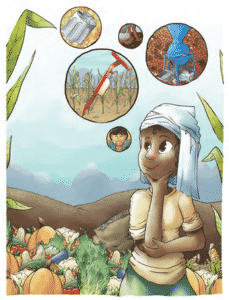Hundreds of millions of people make their livelihoods from hillside and terraced farming.
We are studying how low-cost sustainable agriculture kits (SAK’s) can improve their lives and protect the environment.
Read the new SAKGlobal books
Watch the new SAKNepal documentary
- Using a comprehensive 30 page survey, SAKNepal has identified priority needs for terrace and hillside farmers. Explore these needs and our solutions to the right.
- Limited Land: One key challenge of terrace farmers is limited land surface area for cultivation and livestock grazing. Solution
- Terrace Edges: Another problem faced by terrace farmers is that crops with expansive root systems such as corn show low yields on terrace edges, which comprise 10-20% of the horizontal land area. Solution
- Female Drudgery: The narrowness of many terraces means that livestock cannot pass, thus forcing women to cultivate soils manually, requiring back-breaking labour. Women and girls also need to walk across difficult terrain to collect animal fodder and fuelwood. Solution
- Low Input Access: Terrace farmers are often located in remote, mountainous areas, with poor access to inputs (e.g. fertilizers, hybrid seeds, chemical pesticides, tools). Solution
- Female Illiteracy: Inherent to terrace agriculture is that such farms are in mountainous regions, creating logistical barriers to obtaining knowledge of best practices; for the same reasons, these regions are also associated with high rates of female illiteracy. Solution
- Micronutrient Deficiencies: Women and young children in fragile environments sometimes lack micronutrient including zinc, as well as critical amino acids that are deficient in cereals (lysine, methionine, tryptophan). Solution
- Soil Degradation: Climate change causes terrace farmers to be especially at risk: intensifying rain storms can cause soil erosion and nutrient leaching from terrace edges, while extended drought can cause soil crusting which leads to erosion upon the first heavy rains. Solution
- Drought: The Monsoon rains are sometimes delayed in Nepal. In a normal year, however, Nepal has an extended dry season, which when combined with the remoteness of terrace farms causes out-migration to cities for employment and lack of feed for animals. Solution
- Post-harvest Losses: Poor storage of grain can cause dramatic losses in grain post-harvest due to fungal infections and insect damage. Combined with the remote location of terrace farms and lack of frequent transport to cities, excess grain must be sold when possible to middlemen, rather than being stored. Solution
- Deforestation: Farmers collect tree branches for animal fodder and firewood, leading to deforestation. Some of these trees are the food source for animals including the amphi tree which bears fruit that feeds local monkeys in Nepal; once these trees are gone, the monkeys eat maize in farmers’ fields. Solution
- Scaling Up: Terrace farmers live in remote regions that are less accessible to NGOs and governments. Many development projects reach only hundreds of farmers, at great cost, in regions inhabited by millions of needy households. A scaling up strategy is needed for remote, mountainous areas. Solution
- Earthquake Relief Response: The University of Guelph SAKNepal team has developed a responsive set of resources intended to be helpful to Nepalese farmers affected by the earthquake, accompanied by detailed illustrations to inform farmers on their use. Please visit SAKglobal.org to access these resources. SAKglobal.org
